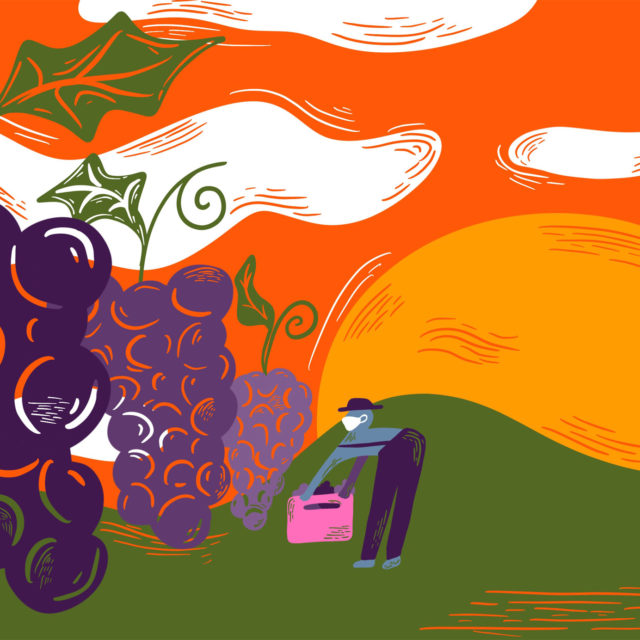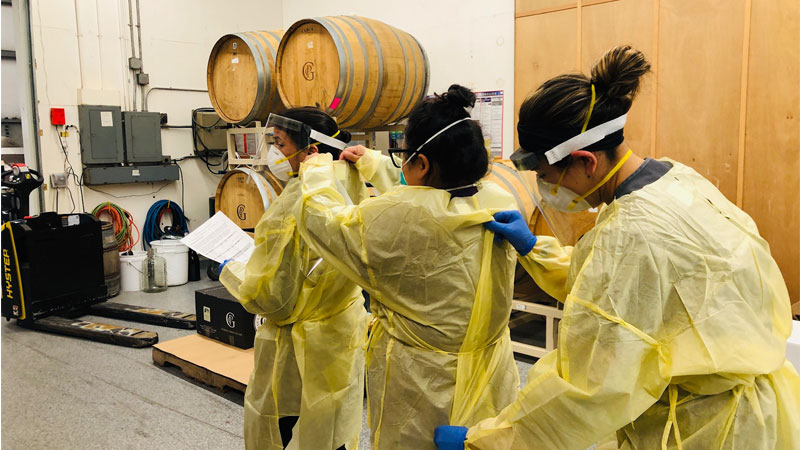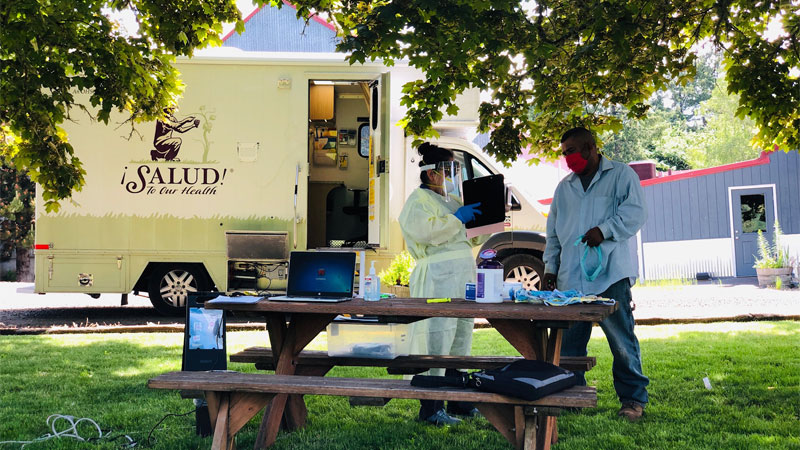Sadie Drury, general manager of North Slope Management in Walla Walla, Wash., was doing everything right. She implemented and enforced all the recommended safety protocols, and yet, two of her employees — who lived together in shared, family housing — contracted Covid-19. With social distancing and masks in place, none of her other employees tested positive, but one of the two who were infected devastatingly passed away. “That hit us really hard,” she says. “It was a longtime supervisor in our company who had worked with us since the late ‘90s.”
The Latinx community, which makes up the majority of the U.S. wine industry’s farmworkers, has proven to be especially vulnerable to Covid-19. In California, for example, Latinx persons account for 59 percent of positive Covid-19 cases and 47 percent of deaths, despite making up just 39 percent of the state’s population, according to the California Department of Public Health. This vulnerability is mostly attributed to the farmworker community’s low-income, socioeconomic realities; many workers live in multi-family housing and often carpool together in vans and other large transport vehicles. In Napa County alone, an outbreak of roughly 70 cases of Covid was reported in the county’s farmworker centers in July.
As the 2020 harvest kicks off, maintaining the health of farmworkers is a top priority for wineries and vineyard management companies. If outbreaks do occur among vineyard crews, the wine industry could find itself in the midst of a labor shortage during the busiest time of year, and some operations may even be forced to shut down for two weeks. But while companies can do their part by creating safer work environments — requiring masks, performing daily temperature checks, separating teams into small cohorts, and social distancing — there are no fail-safe measures.
Don't Miss A Drop
Get the latest in beer, wine, and cocktail culture sent straight to your inbox.There is, however, some help. For instance, the Napa Valley Farmworker Foundation and the Napa Valley Grapegrowers have joined forces with the St. Helena Hospital Foundation to fund and supply a mobile health unit capable of testing up to 100 workers a day at vineyard sites. These organizations and others — like ¡Salud!, a healthcare and outreach organization created by Oregon winemakers to address the needs of vineyard workers — are mobilizing to protect workers by offering education, resources, and health screenings that can, in turn, help pilot the industry through a harvest season like no other.
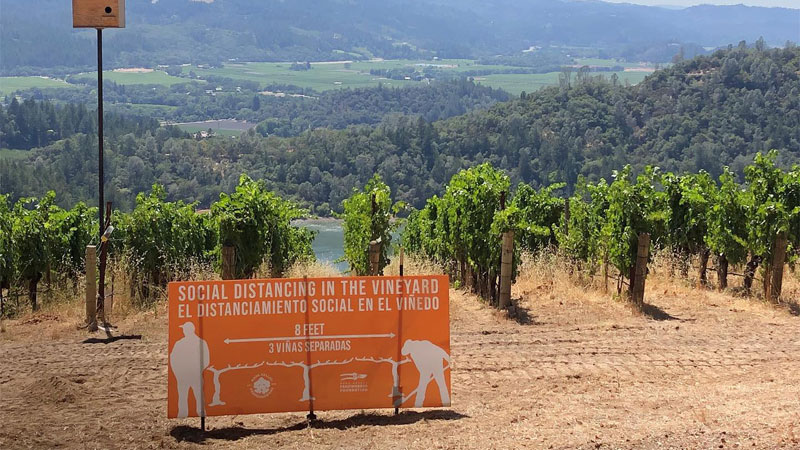
Preventive Education Comes First
“Understanding how the virus transmits empowers people to make conscientious decisions both inside and outside of work,” says Molly Williams, industry and community relations director at the Napa Valley Grapegrowers and the Napa Valley Farmworker Foundation. The latter launched a Covid-19 task force and statewide education campaign, which includes resources like podcasts, videos, and posters.
Education is also an integral focus of programming for ¡Salud!. “There’s an element of education not always permeating into that community. We explain it in their own language and in the context of their own culture, which makes it more relatable and understandable,” says Stephanie Buchanan, ¡Salud!’s manager of philanthropy, who argues that education is just as important when a worker tests negative.
“We really drive home that you need to take precautions and how this impacts not just you, but your family as well,” she says. “People hear ‘negative’ and that’s what they focus in on.”
Drury, of North Slope Management, is in constant communication with her crew, regularly passes out printed flyers, and has created a group text thread for updates and reminders related to the virus. One of her employees, Francisco Hernandez, says one effective strategy has been for supervisors to communicate that a worker’s failure to follow health guidelines and social distancing rules can result in a loss of work, and thus income.
“It really sucks to work with the mask when it’s 80 to 90 degrees, but the attitude is that this is the only way we can move forward,” Hernandez says. “It’s not just for safety. What we’re implementing and the rules we follow, we’re keeping our jobs and feeding our families by doing that.”
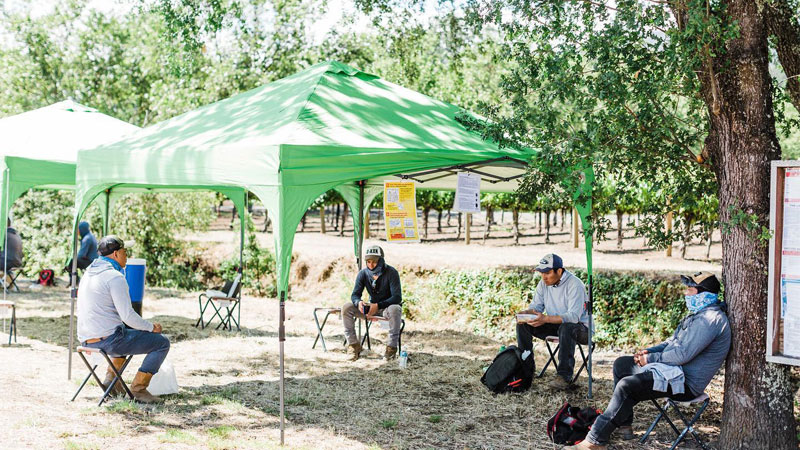
Bringing Testing Into the Vineyard
While testing is seemingly the most effective strategy for keeping the virus out of the workplace, it’s not always readily accessible. Workers might not have the transportation resources to get tested or the proper identification, they may fear a language barrier, and be wary of how the test could affect their employment or immigration status. Major delays in result turnarounds nationwide further complicate things; test results in places like Napa County are sometimes taking more than 10 days.
One solution is to bring testing into the vineyards, like the mobile testing effort in Napa Valley that has conducted more than 1,600 tests since last month. Interested employers can reach out to the St. Helena Hospital Foundation to schedule testing. “From knowing the workers here, I feel like that would be a much better option for them,” says Hernandez.
Similarly, ¡Salud! launched an appointment-based mobile clinic that provides no-cost Covid screenings at vineyard locations. “We record things like height, weight, blood pressure, we do basic lab work like A1C, which can give us a sense of underlying conditions — diabetes being one of the major concerns of this population — and then we have an optional Covid screening,” says Buchanan, noting that 87 percent of farmworkers have opted into testing, with results delivered by phone 24 hours later.
Leveraging Local Support Services
By getting creative, seeking out, and utilizing local resources, wineries can ease the fears of their employees when it comes to testing and support them if they get sick. “For this population, a positive diagnosis means not being able to work for several weeks and especially right now, heading into harvest, this is when they make their money,” says Buchanan. “A positive diagnosis right now has a really big impact on that person’s financial outlook and on their family’s outlook.”
In order to eliminate the financial burden, Drury is working with a local nonprofit winery that raises funds for vineyard workers’ health care. This enables her company to pay workers to stay home if they are exhibiting symptoms, receive a positive diagnosis, or were in close contact with someone who tested positive. “We’ve figured out a way to pay our workers to encourage them to stay home and prevent people from not reporting symptoms,” she says.
When Hernandez was experiencing symptoms that he believed were allergies, he was able to go home for a few days while awaiting his test result. Ultimately, the test came back negative. “They were able to pay me for the days I took off, which was an assurance,” Hernandez says. “When you feel fine, you don’t really want to take time off, but when they have those policies in place, it makes it really nice to say, ‘I should follow the rules and I should go along with it.’”
Both ¡Salud! and the Napa Valley Farmworkers have sought out local resources that can provide isolated housing in the event of a positive test result, connect workers with medical care and a translator, deliver groceries, and provide assistance with child care. “Right now, there’s more and more coming to light about health care disparities and there are a lot of organizations out there,” says Buchanan. “It just takes being proactive.”
“We’re not just supporting the worker as a worker, “ echoes Williams, “but in a way that touches their whole life and supports their family as well.”
This story is a part of VP Pro, our free content platform and newsletter for the drinks industry, covering wine, beer, and liquor — and beyond. Sign up for VP Pro now!
